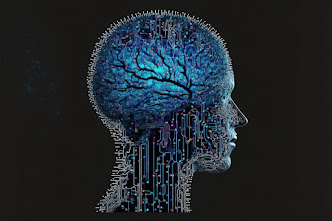What is Brain-Computer Interface (BCI)?
Brain-Computer Interface (BCI) is a
groundbreaking technology that enables direct communication between the human
brain and external devices. By detecting neural signals, BCIs help control
computers, prosthetics, and even smart home devices without physical input.
This innovation has the potential to revolutionize how humans interact with
machines, making technology more accessible and intuitive. BCIs work by using
sensors to capture brain activity, which is then translated into commands that
control external systems. Researchers are continuously improving the efficiency
and accuracy of these systems, making them more practical for real-world
applications.
Applications
of BCI in Healthcare
BCIs are transforming healthcare,
especially for people with disabilities. Paralyzed individuals can control
wheelchairs or robotic limbs, restoring their independence. Patients with
neurological disorders like ALS or stroke can regain communication abilities
through brain-controlled typing systems, allowing them to interact with others
despite mobility challenges. BCIs are also being explored for
neurorehabilitation, helping stroke survivors regain motor function by
retraining the brain. Additionally, researchers are investigating how BCIs can
help individuals with epilepsy by predicting and preventing seizures in
real-time.
BCI in
Gaming and Virtual Reality
Gaming companies are exploring BCI
to create immersive experiences where players can control characters using
their thoughts. This eliminates the need for traditional controllers, providing
a more natural way to interact with virtual environments. In virtual reality,
BCI could enhance realism by adapting environments based on a user’s mental
state, creating personalized experiences. This technology could also benefit
esports players by improving reaction times and focus. As BCI research
advances, we may see thought-controlled gaming become a mainstream reality.
Challenges
and Ethical Concerns
While BCIs hold great promise,
challenges remain. Data privacy is a major concern, as brain signals contain
highly sensitive personal information. There are also risks of hacking, which
could lead to unauthorized access to a user’s neural data. Ethical concerns
about mind-reading technology and the potential for misuse must be carefully
addressed through regulations and policies. Additionally, ensuring
accessibility and affordability will be crucial for widespread adoption, as
current BCI systems remain expensive and complex. Future advancements must
focus on making BCIs secure, ethical, and available to all who can benefit from
them.
SPONSORSHIP:
This Content Sponsored by Buymote Shopping app
BuyMote E-Shopping Application is One of the Online Shopping App
Now Available on Play Store & App Store (Buymote E-Shopping)
Click Below Link and Install Application: https://buymote.shop/links/0f5993744a9213079a6b53e8
Sponsor Content: #buymote #buymoteeshopping #buymoteonline #buymoteshopping #buymoteapplication

